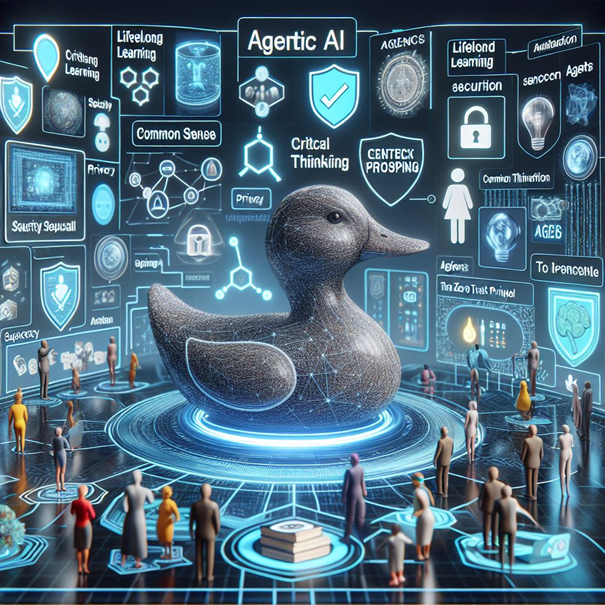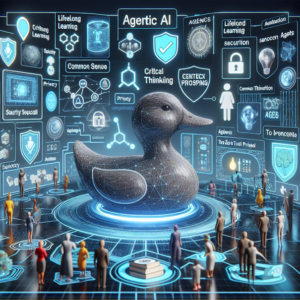In today’s digital era, where artificial intelligence (AI) and automation are becoming increasingly important, it is essential that companies and their employees prepare themselves for the new challenges and opportunities. A key aspect of this preparation is context-based AI application and prompting, which should be considered a mandatory subject in combination with common sense and critical thinking.
The importance of context-based AI prompting
Context-based AI application and prompting refers to the ability to use AI systems and tools in a way that provides relevant and accurate results. This requires a deep understanding of the context in which the AI is used, as well as the ability to ask the right questions and use the right data. In practice, this means that employees must be able to understand the specific requirements, processes and goals of their organization and incorporate this information into their interactions with AI systems.
An example of the importance of context-based AI application and prompting can be found in the integration of AI into Microsoft 365, where tools such as Microsoft Copilot, Teams and Power BI can be used to improve efficiency, decision support and ultimately decision making. However, this requires users to ask the right questions multiple times if necessary and use the right contextually appropriate data to achieve the desired results with multiple iterations if required.

Lifelong learning, adaptability and analogy to the queen “duck”
Handling and interacting with AI will soon be as important as learning to speak, write and read. These skills should be considered a compulsory subject and an important discipline in lifelong learning. On a humorous note, interacting with AI and especially with AI agents brings humans closer to the “queen of the animal kingdom”, the duck. This duck can swim, dive and even fly. The duck is also highly adaptable and can find its way around streams, (data) rivers, ponds, lakes and sometimes even (data) seas. Perhaps humans with such powerful tools (toolset) and skills (skillset) will also be able to “take off” and “fly in the technology universe” in an increasingly (ag)entic working method, at least in their thoughts and mindset.
Common sense and critical thinking
In addition to context-based prompting, common sense and critical thinking are crucial for the successful use of AI. Common sense helps to interpret and evaluate the results of AI systems, while critical thinking makes it possible to question the underlying assumptions and data. This is particularly important as the technical basis of deep learning makes transparency difficult and therefore requires careful evaluation of the results by the user.
Another important aspect is the ability to take contextual factors into account, such as the practicability of the results. This requires a deep understanding of the organization’s specific requirements, processes and goals, as well as the ability to incorporate this structured information into interactions with AI systems.
The role of education and training
To ensure that employees are able to use context-based prompting, common sense and critical thinking effectively, comprehensive education and training is required. This includes both technical training on the use of AI tools and training to develop critical thinking and problem-solving skills.
One example of such training is the Digital DNA programme, which aims to promote employees’ digital and technological literacy while strengthening their ability to self-organize and build resilience. By combining technical training and the development of soft skills, employees can be better prepared for the challenges and opportunities of digital transformation and AI readiness.
Preparation for the dynamic, agentic further development of AI
The use of AI tools and context-based prompting is not only relevant for current requirements, but also an important preparation for the very high dynamics and further massive technological developments of AI. Particularly in the areas of “agentic AI” and “networked agents”, it is expected that these technologies will be able to take over certain steps and interactions semi-autonomously or fully autonomously in the future.
Agentic AI uses the collective intelligence of several agents to automate decision-making processes and increase efficiency. These agents and new AI tools can split complex tasks into several, even separate steps (“chain of thought”) and perform “reasoning” in favor of the end results, such as travel planning or interaction with other agents from different applications or portals. The ability of these agents and AI tools to learn autonomously, “critically inquire” when necessary, adapt and make decisions will revolutionize the way companies work and make decisions. It will also enable “low code” / “no code” based applications, developed by the company’s own employees and internal know-how carriers, to make further progress.
Ongoing homework in cybersecurity remains
In addition to the new challenges and opportunities that AI brings with it, there is also older homework that continues to be of great importance. Especially in the area of cybersecurity, the Zero Trust principle, data protection and data security, it is crucial to remain critical and highly sensitized. This includes ongoing cybersecurity awareness and critical thinking, which helps to avoid falling into a dangerous belief in the system and being deceived by false prompts or even disinformation / “deep fake”.
The Zero Trust principle, which states that no user, system, output, result should be automatically trusted, is a central component of modern cybersecurity strategies. It requires continuous review and validation of all access, rights and outputs to ensure that only authorized users and devices have access to sensitive data and systems. Data protection and data security also remain top priorities as threats from cyber attacks and data breaches continue to increase.
Conclusion: Open in mind, critical in thought, intelligent in action = compulsory subject for the future
In a world where AI and automation are becoming increasingly important, it is essential that companies and their employees prepare themselves for the new challenges and opportunities. Context-based prompting, dealing with AI, common sense and critical thinking are key skills that should be considered mandatory. Through comprehensive education and training, employees can be enabled to use these skills effectively and thus improve efficiency and decision-making in their organization. In addition, the use of AI tools and context-based prompting is an important preparation for the dynamic development of AI, especially in the areas of agentic AI and networked agents, which will play an increasingly important role in the future. At the same time, the older homework in the areas of cybersecurity, the zero trust principle, data protection and data security must not be neglected. Critical thinking and continuous awareness-raising are crucial in order to avoid falling into a dangerous belief in the system and jeopardizing the security of the organization or the integrity of relevant decision-making bases.
Fridel Rickenbacher is a former co-founder, co-CEO, partner, member of the Board of Directors and now a participating “entrepreneur in the company” / “senior consultant” at Swiss IT Security AG / Swiss IT Security Group. At federal level, he is represented as an expert and actor in “Digital Dialog Switzerland” + “National Strategy for the Protection of Switzerland against Cyber Risks NCS”. In his mission “sh@re to evolve”, he has been active for years as an editorial member, expert group and association activist at e.g. SwissICT, swissinformatics.org, isss.ch, isaca.ch, bauen-digital.ch in the fields of digitalization, engineering, clouds, ICT architecture, security, privacy, data protection, audit, compliance, controlling, information ethics, in corresponding legislative consultations and also in education and training (CAS, federal diploma).
This article was first published in Schwyzer Gewerbe magazine in March 2025 and is reproduced here with the author’s permission.
Photo: AI generated.








